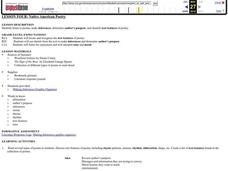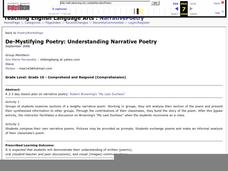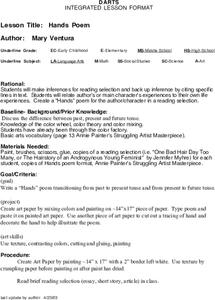National Endowment for the Humanities
Poems that Tell a Story: Narrative and Persona in the Poetry of Robert Frost
Dig in deeper with Robert Frost's, "Stopping by Woods on a Snowy Evening." Learners will read and discuss poems by Robert Frost and learn the meaning of terms such as narrative and personal. They journal, collaborate, and present poetry...
National Endowment for the Humanities
Arabic Poetry: Guzzle a Ghazal!
High schoolers research the evolution and cultural significance of the Arabic ghazal form of poetry. They, in groups, compose an original ghazal poem and read it aloud to the class.
University of British Columbia
Pondering Poetry and Playing with Words
First-year High school scholars explore the world of poetry with an 11-lesson unit that examines a range of poetry forms and tries their hand at crafting their own poems. Young poets then collect their work in a portfolio that they...
Trinity University
Introduction to Poetry
Introduce fourth graders to poetry with a three-week unit that has them examine the structural elements of poetry, analyze poems, and craft their own original poems rich in sensory details and other poetic devices. Young scholars study...
Curated OER
Native American Poetry
Identify text features, make inferences, and discover the cultural significance of Native American Poetry. Sixth graders read several Native American poems and use graphic organizers and literature response logs to record their feelings...
EngageNY
Gathering Evidence and Drafting a Two-Voice Poem (Chapter 13: "Los Duraznos/Peaches")
Begin class with a short comprehension quiz and review and then move into a new genre: two-voice poems. The activity provides information about this type of poetry as well as a video example made by eighth graders that you can show your...
Curated OER
Using Poetry in Teaching Reading to Special Education Students
A series of well-written activities, these lessons prompt middle schoolers reading below grade level (at a second, third, or fourth grade level) to use poetry to practice basic reading skills. They rhyme, build words, make inferences,...
EngageNY
Writing, Critique, and Revising: Two-Voice Poems (Chapter 14: "Las Ucas/Grapes")
Continue work on the two-piece poem that compares two characters from Esperanza Rising. Give class members a few minutes to finish their drafts. After they have a complete product, model how to critique and edit the poems with one group....
Curated OER
Heartsongs Poetry by Mattie Stepanek
Use Mattie Stepanek’s Heartsongs book of poetry to inspire young poets to write about their own lives, experiences, and feelings. After reading the introduction to Mattie’s book, in which he talks about himself and his reasons for...
Curated OER
De-Mystifying Poetry: Understanding Narrative Poetry
Tenth graders explore narrative poetry. They analyze sections of a poem and present to groups. They compose their own narrative poems using pictures as prompts. They exchange their poems and analyze their classmate's poem.
Curated OER
Poetry Project
Choosing a poet or a theme, eighth graders conduct research in the world of poetry. They conduct Internet research and select five poems that fit their poet or theme, and create a seven slide PowerPoint presentation on their selected...
Curated OER
Poems: "The Rabbit"
In pairs or on their own, fourth graders read the poem, "The Rabbit." They then answer eight critical-analysis questions, requiring them to make inferences, and interpret the poem's meaning and use of language. The reading passage,...
Academy of American Poets
Teach This Poem: "In the Next Galaxy" by Ruth Stone
Imagine what life might be like in a different galaxy. That's the challenge young scientists take on in a warm-up activity designed to prepare them for a close reading of Ruth Stone's poem "In the Next Galaxy." After class members share...
Curated OER
Poems that Tell a Story: Narrative and Persona in the Poetry of Robert Frost
Students investigate and explore the poems of Robert Frost. They read and discuss poems by Frost, define narrative and personal, write narratives in a journal, and present a dramatic reading of a poem to the class.
K20 LEARN
The History of Spoken Word Poetry: Historical and Cultural Perspectives In Literature
Spoken word poetry, more than almost any other form, reveals the historical and cultural perspective of the poet. High schoolers listen to various spoken word poems, select one to research in-depth, and then apply what they have learned...
K20 LEARN
Where I'm From: Poetry
We carry memories of where we're from; tweens and teens can capture these memories by first listening to several memory poems and then crafting their own. They analyze literary devices other poets use, brainstorm a list of images they...
National Endowment for the Humanities
In Emily Dickinson's Own Words: Letters and Poems
Analyze the depth and beauty of American Literature by reading Emily Dickinson's letters and poems. The class analyzes Dickinson's poetic style and discusses Thomas Wentworth Higginson's editorial relationship with Dickinson. They pay...
National Endowment for the Humanities
Walt Whitman to Langston Hughes: Poems for a Democracy
Explore the idea of democratic poetry. Upper graders read Walt Whitman, examining daguerreotypes, and compare Whitman to Langston Hughes. They describe aspects of Whitman's I Hear America Singing to Langston Hughes' Let America Be...
Curated OER
Poetry: An investigation of Life
AP English Language and Composition requires that class members be able to formulate an argument and support it. Use this resource to focus on the life of Emily Dickinson. It requires individuals to research her life and make inferences...
West Corporation
Making Inferences – Use Your Mind to Read!
How can you tell if someone is happy? The lesson works with elementary and middle school scholars to activate their schema and pay attention to details to make inferences in their daily lives, poetry, and other literature. Cleverly...
EngageNY
Revisiting Big Metaphors and Themes: Revising and Beginning to Perform Two-Voice Poems
Now that your class has read all of Esperanza Rising, take the time to tackle big metaphors and themes. Pupils will participate in an activity called Chalk Talk, in which they circulate around the room in small groups and add comments to...
Curated OER
Hands Poem
Students create a "Hands" poem for the author/character in a reading selection.They make inferences for reading selection and back up inference by citing specific lines in text. They relate author's or main character's experiences to...
Prestwick House
"Because I could not stop for Death" -- Visualizing Meaning and Tone
Emily Dickinson's "Because I could not stop for Death" provides high schoolers with an opportunity to practice their critical thinking skills. They examine the images, diction, rhythm, and rhyme scheme the poet uses and consider how...
Prestwick House
Teaching Shakespeare: Sonnet 73
It's that time of year to consider how Shakespeare selects his images and structures his Sonnet 73 to develop the meaning of the poem. Class members examine the rhyme scheme, the indented lines, the conceit, and the images used in each...

























